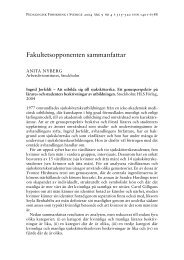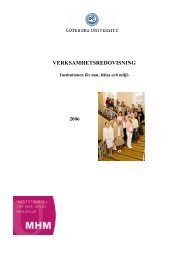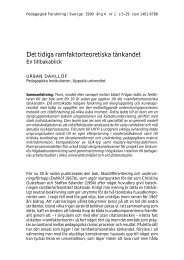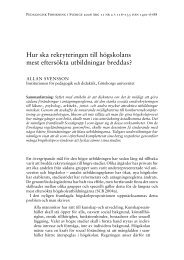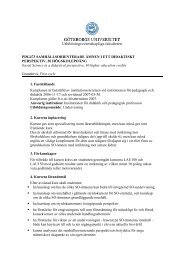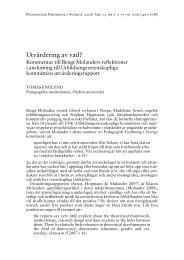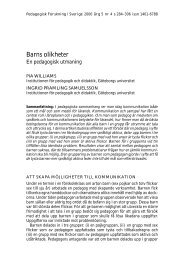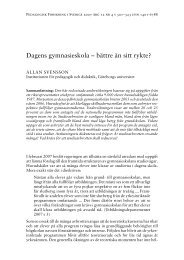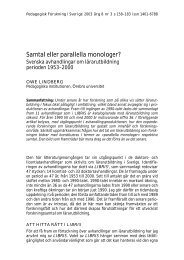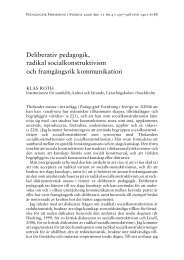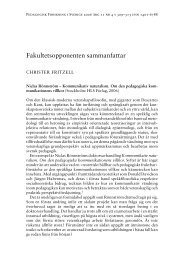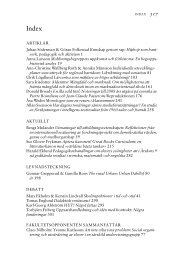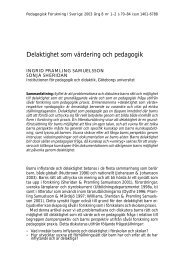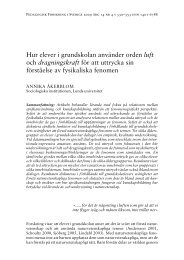University of Oslo Workshops June 29-30 Conference July 1-3 ...
University of Oslo Workshops June 29-30 Conference July 1-3 ...
University of Oslo Workshops June 29-30 Conference July 1-3 ...
Create successful ePaper yourself
Turn your PDF publications into a flip-book with our unique Google optimized e-Paper software.
form <strong>of</strong> civic and citizenship education. The variation in students’ European civic attitudes<br />
are explained by employing multi-level analysis with the type <strong>of</strong> school/curriculum (ELOS<br />
versus ICSS) being an important explanatory variable<br />
Although a general test-score could not be compared, ELOS students perform significantly<br />
better on six <strong>of</strong> the cognitive items <strong>of</strong> a set <strong>of</strong> nine items from the ICCS European Module.<br />
Moreover it seems that better scores are achieved by ELOS students in each <strong>of</strong> the Dutch<br />
school tracks (from pre-vocational to pre-university). As expected, students in the ‘Europe<br />
focused’ ELOS schools report a (slightly) greater sense <strong>of</strong> European identity than their<br />
peers in other schools. Multilevel analysis, employed on two conceptual scales, shows that<br />
ELOS students value equal chances for European citizens more than their peers in ICCS<br />
schools. A significant school effect was found. The scale scores on attitude towards a<br />
(possible) enlargement <strong>of</strong> Europe however did not indicate such an effect. In general the<br />
results <strong>of</strong> this study provide some empirical support for the ELOS programme.<br />
Keywords: European civic and citizenship education; secondary analysis; ICCS; ELOS<br />
The Influence <strong>of</strong> Education Reforms in Latvia on the Quality <strong>of</strong> Civic<br />
Education and Democracy in the Teaching/Learning Process<br />
Ireta Cekse, <strong>University</strong> <strong>of</strong> Latvia, Latvia<br />
Andrejs Geske, <strong>University</strong> <strong>of</strong> Latvia, Latvia<br />
Andris Kangro, <strong>University</strong> <strong>of</strong> Latvia, Latvia<br />
<br />
The transition to a democratic state management form has been taking place in Latvia since<br />
regaining the independence. The changes have most directly affected also the education<br />
system which has been continuously improved. The transformation <strong>of</strong> paradigms is one <strong>of</strong><br />
the aspects <strong>of</strong> education reforms. The teaching/learning methods used in the lessons have<br />
essentially changed. The aim <strong>of</strong> this study is to find out how the change <strong>of</strong> the education<br />
paradigm from teaching to learning has influenced the quality <strong>of</strong> civic education and the<br />
use <strong>of</strong> democratic study forms in the lessons. In order to achieve the given aim, the study<br />
will search for the relations between the achievement <strong>of</strong> Grade 8 students <strong>of</strong> Latvia in civic<br />
education and students’ attitudes. Special attention will be paid to a democratic learning<br />
environment and the differences in students’ who learn in the Latvian language and who<br />
learn in the Russian language attitudes to the freedom <strong>of</strong> word when discussing political<br />
and social political issues in the lessons. The study performed the secondary analysis <strong>of</strong><br />
Latvia’s data in IEA CIVED and IEA ICCS, using the descriptive statistic methods.<br />
Keywords: IEA ICCS; IEA CIVED; international comparative studies; quality <strong>of</strong> civic<br />
education; CIVED; international comparative studies; education reform in Latvia; quality<br />
<strong>of</strong> civic education<br />
72



